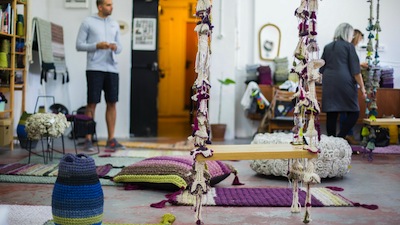The label for an Iota rug and pouf hand-knit by Kefaya, a Bedouin woman. (photo from Iota)
Some of the best projects are born out of a desire for change – at least that was the case with Iota, an Israel-based textile company empowering unemployed women through the art of crochet.
Each one of the company’s rugs, pillows and home accessories is hand-crocheted by Bedouin women from their own homes, providing them with meaningful work and an independent source of income.
Bedouins are an Arab Israeli subgroup, located mainly in the south, with their own distinct culture and social norms. Historically, Bedouins lived a nomadic lifestyle, and many still herd livestock. Women traditionally tend to the house and children, resulting in high unemployment and poverty rates. A 2015 survey showed the employment rate among Bedouin women as 22%, compared to 32% for all Arab women.
Founded by Shula Mozes, an active social entrepreneur for more than 16 years, Iota aims to support the many women, all over the world, who are unable to work outside of the home due to cultural, religious and geographical reasons.
When she started the company in 2014, Mozes chose crochet, a self-taught hobby, as a means to create a business that could empower these women and fuel social change. With the help of creative director Tal Zur, she later discovered that not only is crochet a very versatile technique, but it has its own universal language that can be written and learned, like music notes.
“I realized that if I can learn to make things by crocheting small elements and putting them together, maybe we can teach women who don’t have work how to do the same,” Mozes said.

Iota now runs a small studio in Tel Aviv, where an all-female team of textile experts dreams up intricate designs. At least once a week, a member of the Iota team travels to Hura, a Bedouin village in southern Israel, to deliver raw materials to the women the company employs. Once complete, the finished products are transported back to Tel Aviv, each piece bearing a label signed by the woman who made it.
Currently, Iota employs three women in Hura, an intentionally small number, Mozes said, in order to maintain a strong commitment to each worker. “We have to respect their culture and empower the women slowly, so that they can work according to what they’re comfortable with,” she said.
Though centred on a 200-year-old technique, Iota’s designs are modern. The yarns used to create each piece are bespoke, developed in-house and produced in a local Tel Aviv factory. Mozes said that, by applying computerized designs, they’re able to create yarns that contain several different colours in the same thread, allowing the carpets to be made with one continuous string of yarn.
While Iota is currently only active in Israel, Mozes said she hopes to collaborate with other communities worldwide, which are experiencing high rates of female unemployment.
In January, Iota exhibited its collection for the third time at Maison & Objet, an international trade fair in Paris known for showcasing innovative design talents. The collection, ranging in price from 200 to 2,000 euros (from $315 to $3,150 Cdn), consists of colourful single-yarn rugs, oversized floor cushions, stools, one-of-a-kind swings and home accessories.
“I hope that, in the future, we will be able to take one of the women with us to an exhibition so she can experience the success of Iota firsthand,” Mozes said. “Without them, none of this would have happened.”
For more information, visit iotaproject.com.
Israel21c is a nonprofit educational foundation with a mission to focus media and public attention on the 21st-century Israel that exists beyond the conflict. For more, or to donate, visit israel21c.org.

